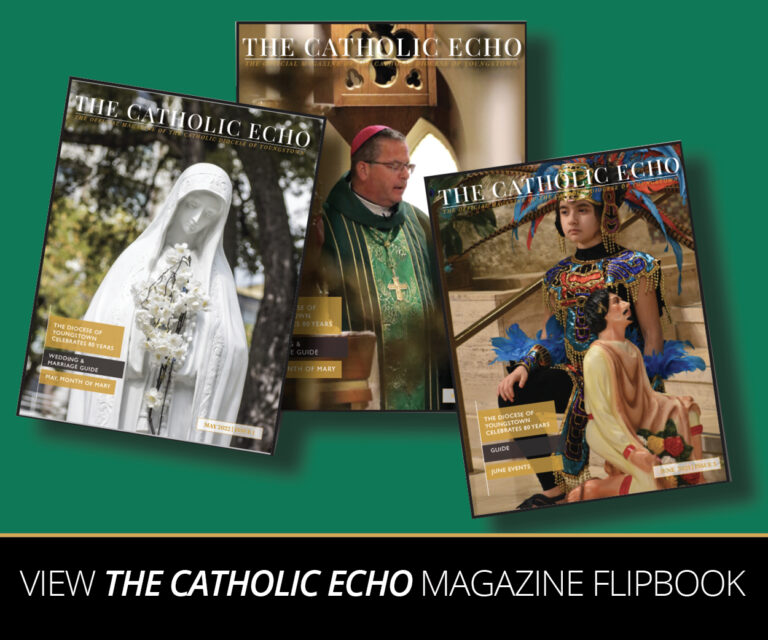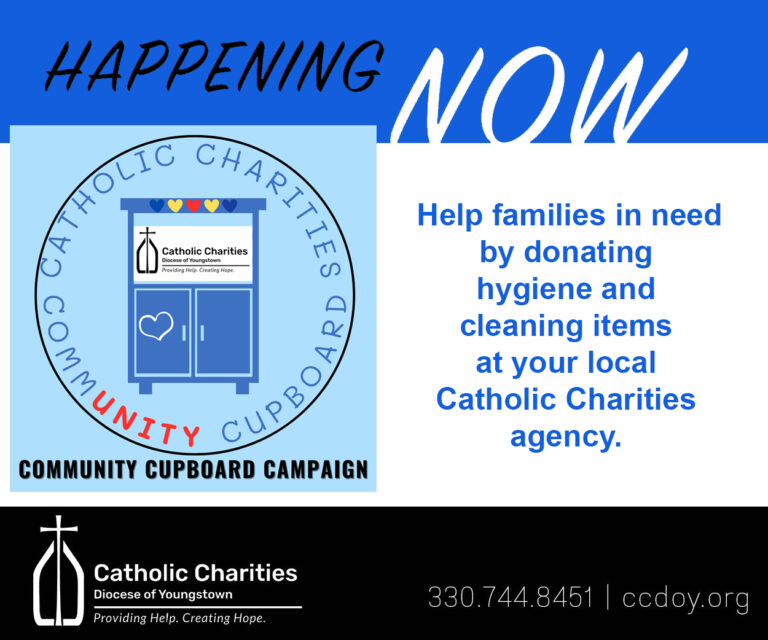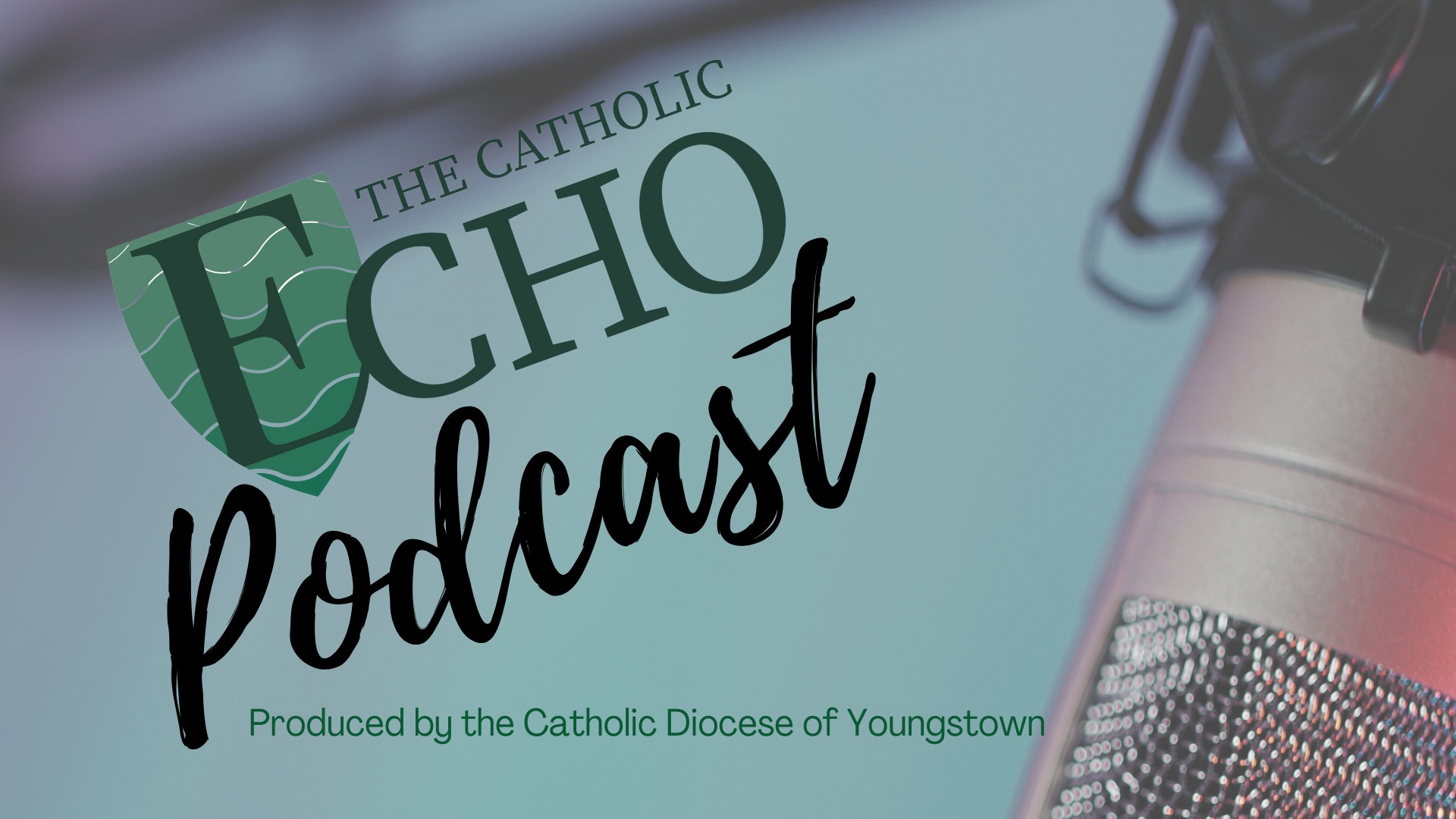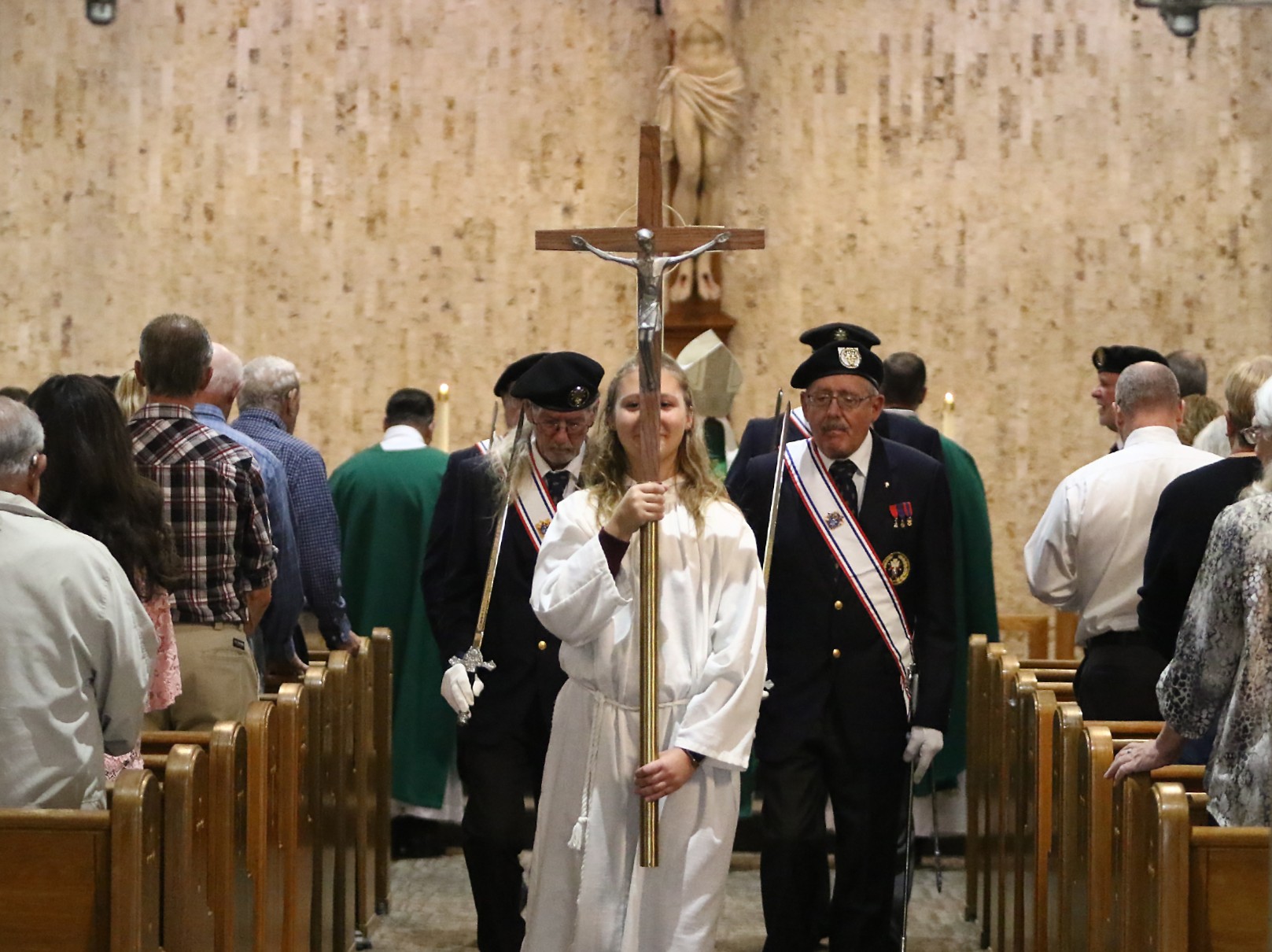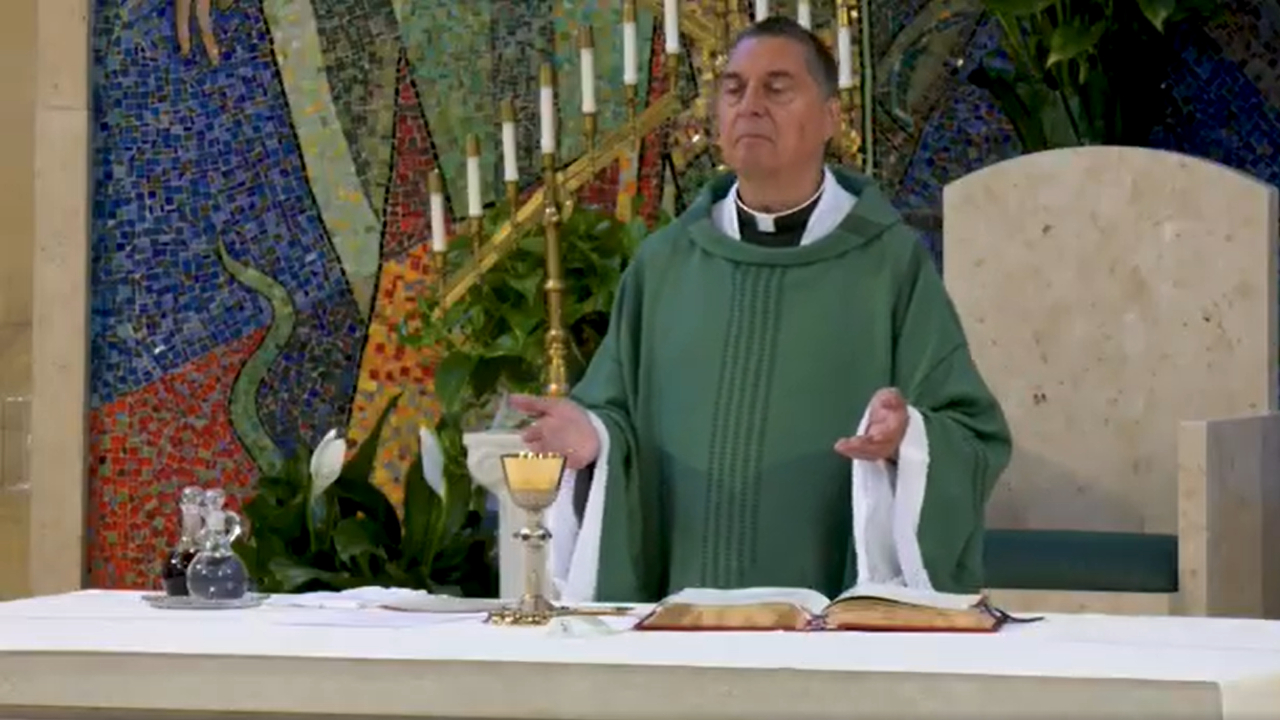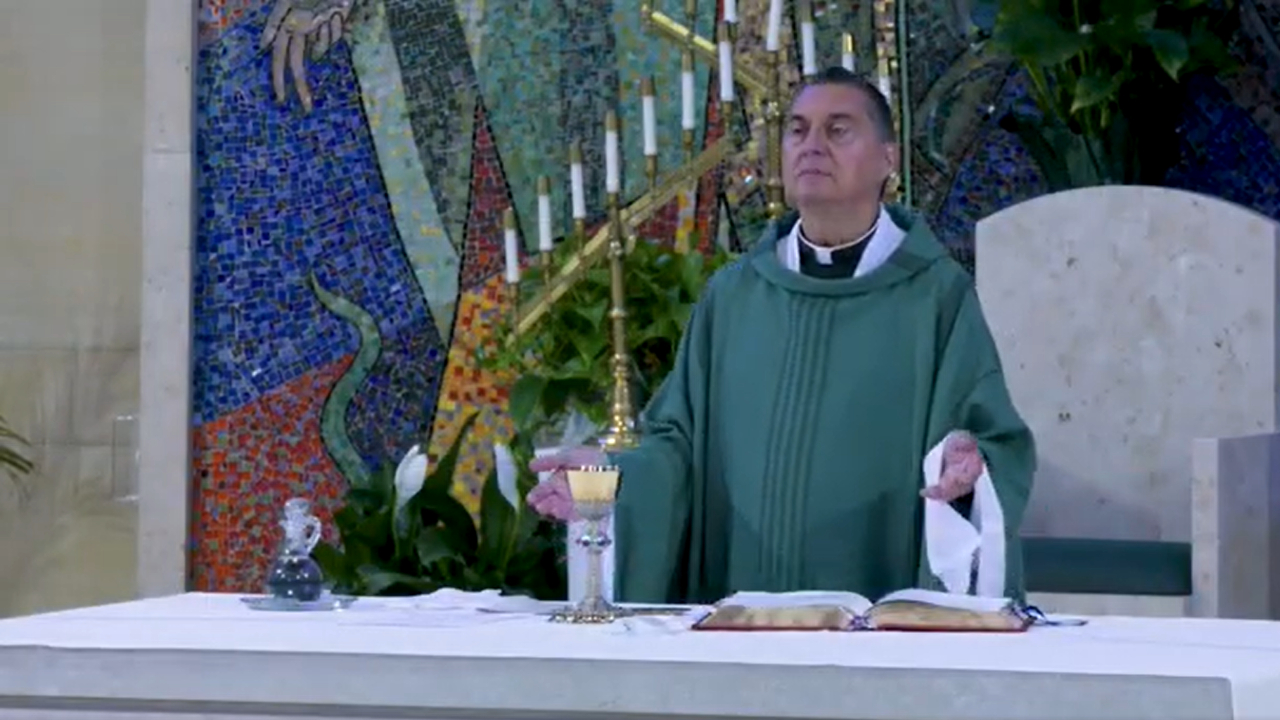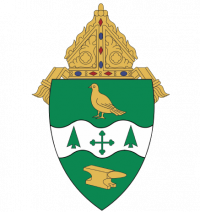Haga clic para la traducción al español.
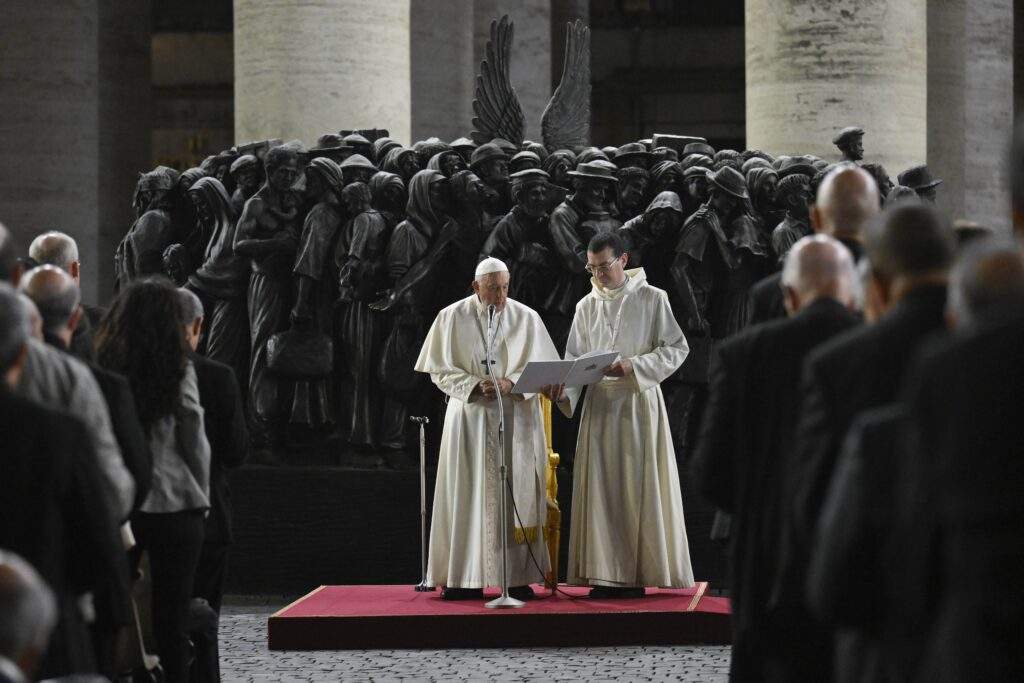
VATICAN CITY (CNS) — Taking to heart the lesson of the parable of the good Samaritan is the key to assisting the millions of migrants and refugees forced to travel far from their homelands and often exploited along the way, Pope Francis said.
“The road leading from Jerusalem to Jericho was not a safe route, just as today the many migration routes that traverse deserts, forests, rivers and seas are not safe,” the pope said Oct. 19 as he led members of the synod on synodality in praying for migrants and refugees.
“How many of our brothers and sisters find themselves today in the same condition as the traveler in the parable?” the pope asked. “How many are robbed, stripped and beaten along the way?”
The evening prayer service took place around “Angels Unawares,” a sculpture by Canadian Timothy Schmalz, that has stood in St. Peter’s Square since 2019. The bronze boat is filled with 140 figures depicting migrants from various historical periods and various nations.
The prayer service “will effectively symbolize walking together with the some of the most vulnerable people on our planet, namely, those who are fleeing, those who are forced to be on the move, those whom we call migrants and refugees,” said Cardinal Michael Czerny, prefect of the Dicastery for Promoting Integral Human Development.
Staff from the dicastery, a refugee from Cameroon and a refugee from Ukraine read the prayers at the service.
In his reflection, Pope Francis called for the reform of immigration policies to increase regular, legal channels for migration, recognizing national economic and demographic policies, but always putting “the most vulnerable at the center.”
And, he said, those policies should recognize the benefits migrants bring to their new homelands, including “the growth of more inclusive, more beautiful and more peaceful societies.”
“All of us must strive to make the road safer, so that today’s travelers do not fall victim to bandits,” the pope said. And “we need to multiply our efforts to combat the criminal networks that exploit the hopes and dreams of migrants.”
Migrants and refugees often “leave their homes deceived by unscrupulous traffickers. They are then sold like commodities. They are kidnapped, imprisoned, exploited and enslaved,” he said. “They are humiliated, tortured and raped. Many of them die without ever reaching their destination.”
“The migration routes of our time are filled with men and women who are wounded and left half-dead, our brothers and sisters whose pain cries out before God,” Pope Francis said.
Although the pope did not mention specific situations, he made references easily compared to the situation of people who had to leave Ukraine because of the Russian invasion or are leaving northern Gaza after the Hamas attack on Israel and Israel’s retaliation.
Often, he said, the people on the move are “fleeing war and terrorism, as we are witnessing, sadly, in these days.”
Cardinal Czerny told Catholic News Service that while migrants and refugees may not be making headlines in media coverage of the synod, “in fact, the synod embraces all those realities in our daily lives, which we need to accompany — or to use the synod word — walk with.”
That is why, he said, after a long day of work in the synod hall, members walked into St. Peter’s Square and to the statue, a monument to “vulnerable people on the move, people in flight, of all ages, of all places, and of all times. So that’s us, all of us.”
Synod members, he said, will pray for people they know, for situations in their own countries and for “the vulnerable people in urgent situations that we know about, like the U.S.-Mexican border or the Mediterranean, or many other places where, unfortunately, people are forced to flee from danger into enormous insecurity.”
Personally, he said, he prays for “whatever is the situation or many situations that I hear about in the course of my work, and each of them would break your heart and they come from all over the world.”
Migration was a major topic at the synod briefing earlier in the day with Cardinal Czerny, Bishop Daniel E. Flores of Brownsville, Texas, Archbishop Dabula Anthony Mpako of Pretoria, South Africa, and Maronite Missionary Father Khalil Alwan, the Lebanon-based secretary-general of the Council of Catholic Patriarchs of the Middle East.
Bishop Flores, whose diocese is on the border with Mexico, said his people are not wealthy, but they are generous.
And, he said, in receiving, welcoming and assisting the families who cross the border, generally with the permission of the United States government, Catholics work with other Christian churches as well as the Muslim and Jewish communities. There also is constant communication and coordination with the bishop of Matamoros, Mexico, across the river, who also is hosting and ministering to migrants coming from South and Central America.
Pope Francis told those at the prayer service that while it is easy to look the other way — or walk on the other side of the road as characters in the parable did — the Gospel calls Christians “to be neighbors to all the wayfarers of our time, to save their lives, to heal their wounds and to soothe their pain.”
“For many, tragically, it is too late, and we are left only to weep over their graves, if they even have a grave,” he said. “Yet the Lord knows the face of each of them, and he does not forget it.”
Copyright ©2023 Unless otherwise noted: © OSV News / Our Sunday Visitor, Inc. 2023; all content before December 31, 2022 © Catholic News Service / U.S Conference of Catholic Bishops. Send questions about this site to osvnews@osv.com.
En servicio de oración sinodal, el Papa pide una reforma migratoria enfocada en los más vulnerables
Por Cindy Wooden, Catholic News Service
CIUDAD DEL VATICANO (CNS) — Tomar en serio la lección de la parábola del buen samaritano es la clave para ayudar a los millones de migrantes y refugiados obligados a viajar lejos de sus países de origen y a menudo explotados en el camino, dijo el Papa Francisco.
“El camino que conducía de Jerusalén a Jericó no era una vía segura, como tampoco lo son hoy las numerosas rutas migratorias que atraviesan desiertos, bosques, ríos, y mares”, dijo el Papa el 19 de octubre mientras guiaba un servicio de oración por los migrantes y refugiados con los miembros del sínodo sobre la sinodalidad.
“¿Cuántos hermanos y hermanas se encuentran hoy en la misma condición del caminante de la parábola?” preguntó el Papa. “¿Cuántos son asaltados, despojados y golpeados a lo largo del camino?”
El servicio de oración de la tarde tuvo lugar alrededor de “Angels Unawares”, una escultura del canadiense Timothy Schmalz, que se encuentra en la Plaza de San Pedro desde 2019. El barco de bronce está lleno de 140 figuras que representan a inmigrantes de varios períodos históricos y de varias naciones.
El servicio de oración “simboliza efectivamente caminar junto con algunas de las personas más vulnerables de nuestro planeta, es decir, aquellos que huyen, aquellos que se ven obligados a desplazarse, aquellos a quienes llamamos migrantes y refugiados”, dijo el cardenal Michael Czerny, prefecto del Dicasterio para el Servicio del Desarrollo Humano Integral.
Personal del dicasterio, un refugiado de Camerún y un refugiado de Ucrania leyeron las oraciones durante el servicio.
En su reflexión, el Papa Francisco llamó a reformar las políticas migratorias para incrementar los canales regulares y legales de migración, reconociendo las políticas económicas y demográficas nacionales, pero siempre poniendo “en el centro a los más vulnerables”.
Y, dijo, esas políticas deberían reconocer los beneficios que los inmigrantes aportan a sus nuevos países de origen, incluido “el crecimiento de sociedades más inclusivas, más hermosas y pacíficas”.
“Todos debemos comprometernos a hacer más seguro el camino, para que los viajeros de hoy no sean víctimas de los bandidos”, dijo el Papa. “Es necesario multiplicar los esfuerzos para combatir las redes criminales, que especulan con los sueños de los migrantes”.
Los inmigrantes y refugiados a menudo “parten engañados por traficantes sin escrúpulos. Luego son vendidos como mercancías. Son secuestrados, encarcelados, explotados y convertidos en esclavos”, afirmó. “Son humillados, torturados, y violentados. Y muchos, muchos mueren sin llegar nunca a su destino”.
“Las rutas migratorias de nuestro tiempo están pobladas por hombres y mujeres heridos y abandonados medio muertos; por hermanos y hermanas cuyo dolor clama ante la presencia de Dios”, dijo el Papa Francisco.
Aunque el Papa no mencionó situaciones específicas, hizo referencias fácilmente comparadas con la situación de las personas que tuvieron que abandonar Ucrania debido a la invasión rusa o que están abandonando el norte de Gaza después del ataque de Hamás a Israel y las represalias de Israel.
A menudo, dijo, las personas que dejan sus países “a menudo son personas que escapan de la guerra y del terrorismo, como vemos lamentablemente en estos días”.
El cardenal Czerny dijo a Catholic News Service que, si bien los inmigrantes y refugiados tal vez no estén en los titulares de la cobertura mediática del sínodo, “de hecho, el sínodo abarca todas esas realidades de nuestra vida diaria, que debemos acompañar, o utilizar la palabra sínodo: caminar con”.
Por eso, dijo, después de un largo día de trabajo en la sala del sínodo, los miembros caminaron hacia la Plaza de San Pedro y hacia la estatua, un monumento a “las personas vulnerables en movimiento, personas en fuga, de todas las edades, de todos los lugares y de todos los tiempos. Así que esos somos nosotros, todos nosotros”.
Los miembros del Sínodo, dijo, orarán por personas que conocen, por situaciones en sus propios países y por “las personas vulnerables en situaciones urgentes que conocemos, como la frontera entre Estados Unidos y México o el Mediterráneo, o muchos otros lugares donde, desafortunadamente, la gente se ve obligada a huir del peligro hacia una enorme inseguridad”.
Personalmente, dijo, el ora por “cualquiera que sea la situación o muchas situaciones que escucho en el transcurso de mi trabajo, y cada una de ellas te rompería el corazón y vienen de todas partes del mundo”.
La migración fue un tema importante en la sesión informativa del sínodo más temprano ese día con el cardenal Czerny; el obispo Daniel E. Flores de Brownsville, Texas; el arzobispo Dabula Anthony Mpako de Pretoria, Sudáfrica; y el padre misionero maronita Khalil Alwan, el secretario general con sede en el Líbano del Consejo de los Patriarcas Católicos de Oriente Medio.
El obispo Flores, cuya diócesis está en la frontera con México, dijo que su gente no es adinerada, pero sí generosa.
Y, dijo, al recibir, acoger y ayudar a las familias que cruzan la frontera, generalmente con el permiso del gobierno de Estados Unidos, los católicos trabajan con otras iglesias cristianas, así como con las comunidades musulmana y judía. También hay comunicación y coordinación constante con el obispo de Matamoros, México, al otro lado del río, quien también acoge y atiende a inmigrantes procedentes de América del Sur y Central.
El Papa Francisco dijo a los presentes en el servicio de oración que si bien es fácil mirar hacia otro lado (o caminar al otro lado del camino como lo hicieron los personajes de la parábola), el Evangelio llama a los cristianos “a ser prójimos de todos los caminantes de hoy, para salvar sus vidas, curar sus heridas y aliviar su dolor”.
“Lamentablemente, para muchos es demasiado tarde y no nos queda más remedio que llorar sobre sus tumbas, si las tienen”, dijo. “Pero, el Señor conoce el rostro de cada uno de ellos y no los olvida”.

